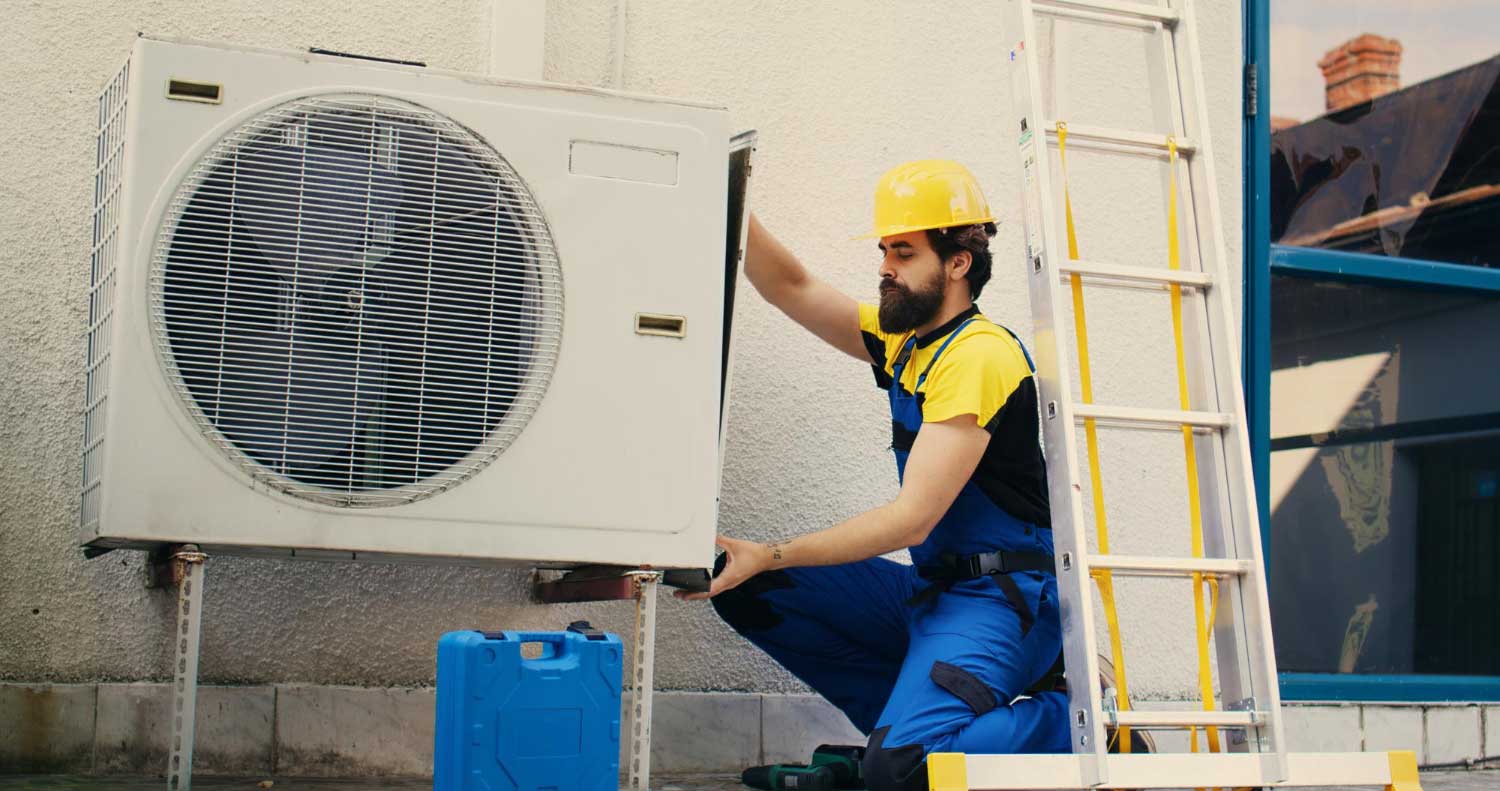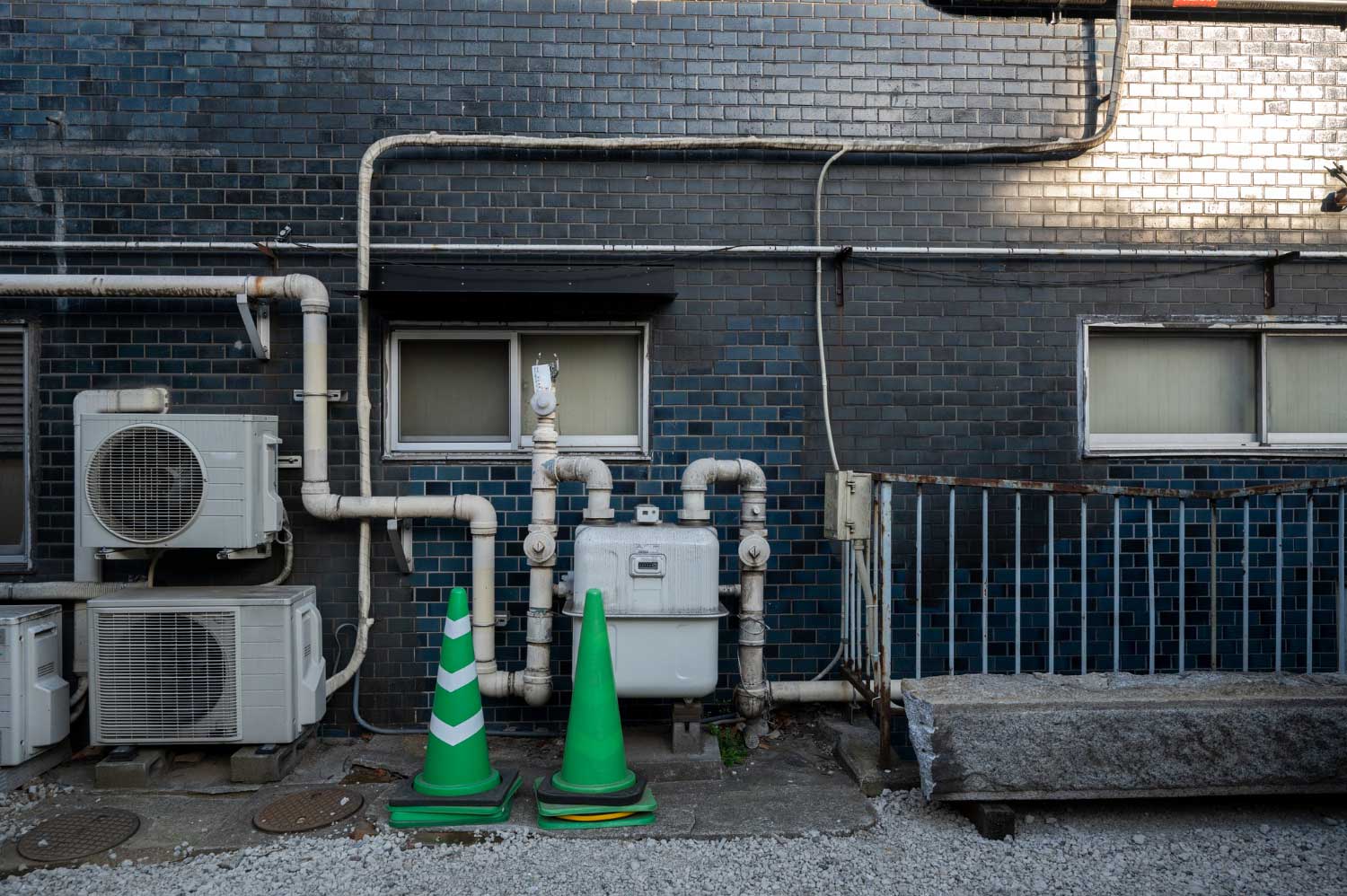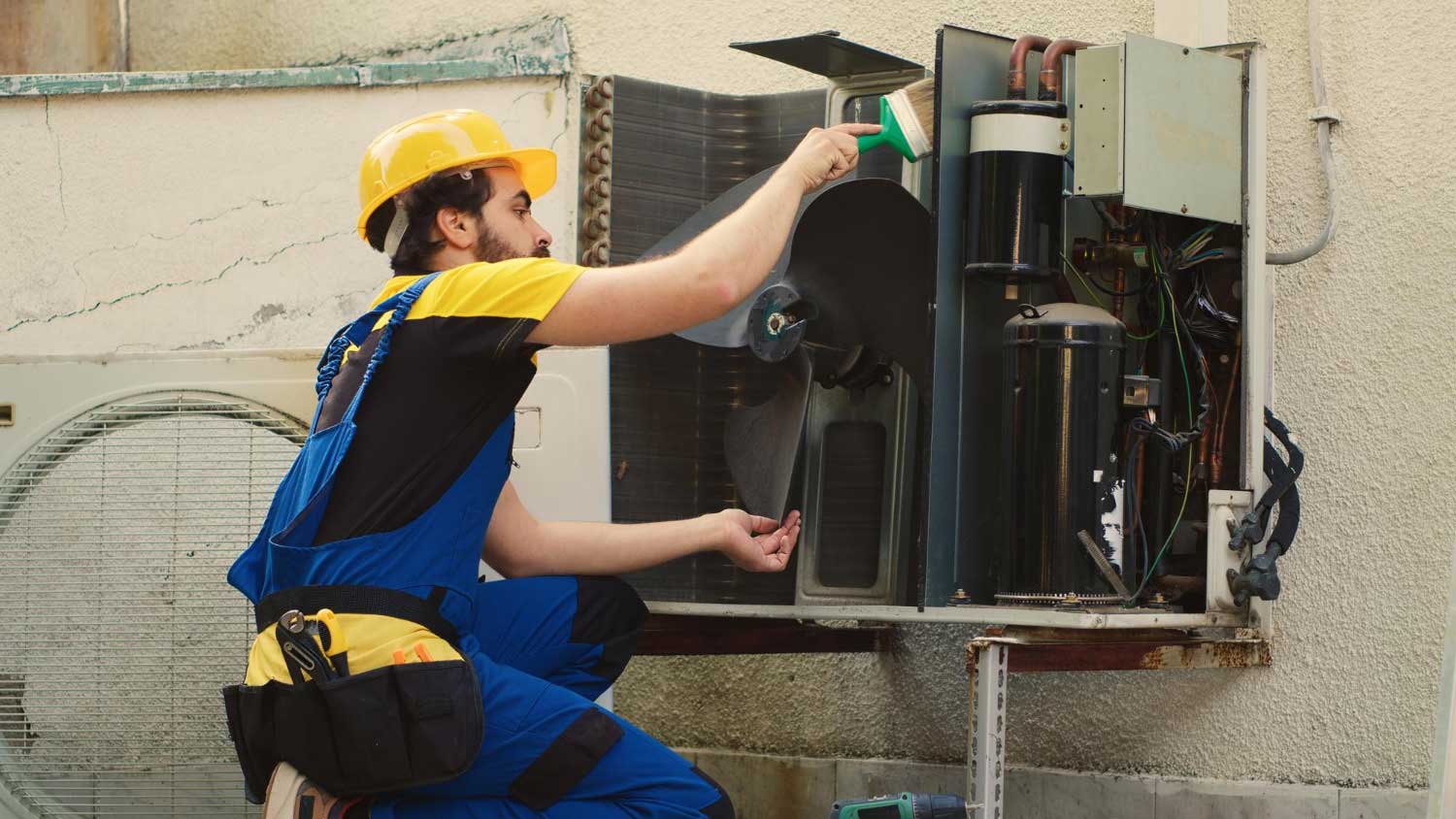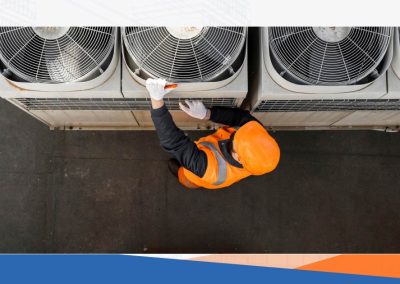Is your AC unit leaking water? If yes, don’t take it as a normal issue even though your AC unit is cooling the air. It is a serious issue and needs to be solved earlier to avoid expensive repairs and health hazards.
Don’t be panic! In this article, we’ve highlighted all key causes and prevention hacks like:
- Reasons behind water leakage,
- How can you stop water leakage by yourself?
- Ways to unclog your air conditioner drain line, and more.
Without more talk, let’s get started!
Why is Your AC Unit Leaking Water?

From clogged drain lines to condensate breaks, dirty air filters, or others, there are many reasons your AC unit is leaking water. For more in-depth details, let’s look at common AC problems below:
1. Incorrect Installation and Setup
The common reason behind water leaking from the AC unit is incorrect installation or AC setup. So, check if the AC technicians installed it correctly. Is the air conditioner installed unevenly, which means it is on a flat surface, even a roof? If so, you must level it by adjusting the concrete pad.
However, when you use a window AC, the front of the machine can be tilted up slightly, causing water leakage out of the back and outside. Water can also leak if the seals that hold the AC to the window are not placed perfectly.
2. Dirty Air Filter Affects On Air Conditioner
Another common AC unit water leak happens due to clogged or dirty air filters. When air filters accumulate dust and debris, airflow can’t move perfectly over the evaporator coil. Without adequate ventilation or airflow, the coils become too cold and freeze. When the ice begins to melt on the coil, excess water is produced that the drain pan can’t handle, leading to water leakage. You can resolve this issue by changing your air filter.
3. Refrigerant Leaks in Air Conditioner
Is your window AC unit leaking water inside? Or, do you notice a leak and the air conditioner isn’t cooling as usual? If so, your refrigerant level may be leaking. AC requires refrigerant to cool the air, but the leaks cause low pressure in the system. This lower pressure leads the evaporator coil to freeze over. Once the ice melts, water overflows the drain pan and leaks out.
4. Clogged Drainage in AC Unit
This is one of the most common reasons for water leaking from the AC indoor unit. The drainage line in the air conditioner collects moisture through the dehumidification process from the air outside your home. Over time, this line can become clogged with dirt, mold, mildew, and other debris that prevent water from draining properly and lead to leaks.
5. Broken HVAC Condensate Pumps
Do you place your central HVAC unit in the basement or far away in the attic? If so, then it’s not easy to leak water from the system. If you notice water floating, then it might happen due to a broken condensate pump or the float switch on the pump being turned on. Contact a technician to fix the condensate pump and reduce the central AC unit leaking water.
6. Frozen Evaporator Coil in Your AC
A frozen evaporator coil is a common water leakage issue inside the AC unit. The reason behind the frozen evaporator coil is refrigerant leaks and blocked airflow. This leads to moisture buildup, causing the drain pan to overflow and leak water.
7. The Thermostat Not Working Correctly
A malfunctioning thermostat might be a reason for the window or wall AC unit leaking water inside. The thermostat is responsible for regulating the temperature by controlling the AC’s cooling cycles. If it doesn’t work properly, then it can cause the HVAC system to run too frequently or not enough, freezing the evaporator coil. As you have noticed, a frozen coil is the reason for the water overflow from the system.
8. Damaged Insulation with Holes and Cracks
The last, yet another key problem that leads to water leakage is damaged insulation. Not only that, it leads to other issues in your HVAC system, like decreased efficiency, higher energy costs, and reduced cooling capacity. The refrigerant lines balance air between the indoor and outdoor units, and insulation maintains efficiency and prevents condensation. When the insulation is damaged with holes or cracks, condensation forms on the lines themselves; this moisture then drips into surrounding surfaces and causes water leakage.
Is Water Leaking from AC Dangerous?
No, water leaking from an AC is usually not dangerous, but it might cause damage to your home or commercial areas and lead to health hazards. Some key effects are:
- Water damage: A portable AC unit leaking water or any other type of air conditioner can damage walls, ceilings, and floors, resulting in high repair costs.
- Mold growth: Extensive moisture creates an environment conducive to mold growth that can lead to health risks, especially for those who have allergies or respiratory issues.
- Electrical hazards: Water leaks near the electrical components of the air conditioner create short circuits that increase electrical fire risks.
- Reduced efficiency: A water leak from the AC system reduces cooling efficiency and ends up with higher energy bills.
So, whenever you notice water leakage, identify the source and contact a qualified HVAC technician to reduce further damage. However, you can follow prevention tips, such as regular maintenance, changing air filters, and monitoring drainage, to ensure your air conditioner functions effectively.
How to Stop an AC Water Leak Easily at Home?
You can follow DIY hacks to stop indoor or outdoor AC units from leaking water by yourself. Here are step-by-step instructions:
Important supplies:
- Small bottle brush,
- Wet/dry vacuum cleaner,
- A spray bottle containing vinegar or bleach (tip: take a cup of liquid), and
- Paper towels.
Instructions:
- First, turn off the AC power before you start repairing. Wait a little to let the leaking water stop or drain.
- Now that water leakage is stopped, it’s time to locate the drain line, usually a small PVC pipe near the indoor unit.
- Use a wet/dry vacuum to suck out debris.
- Pour a mixture of white vinegar and water down the drain line to clean out.
- Use a plumber’s snake or a flexible wire to remove stubborn clogs if have any.
- Ensure the drain line is clean and pour some water to notice the flow.
However, try to clean or replace air filters to prevent these issues and consult annual AC tune-ups to identify potential damages early on.
How to Unclog Your Air Conditioner Drain Line?

You need several tools to unclog your air conditioner drain line, such as a wet/dry vacuum, wire brush or pipe cleaner, bucket, funnel, protective gloves, cleaning solution, screwdriver, and rag to towel. However, considering the clog, you might need a garden hose or similar tools.
Here are 8 key steps you can follow to unclog your AC drain lines:
Turn off the AC’s Power
Firstly, turn off your AC’s power and unplug the unit to avoid electric shock and damage the unit. Whenever you turn off the power, the water currently stops flowing through your drain lines. Don’t skip this step for the safety measure.
Locate the Drain Line Pipe
Now that you’ve switched off the air conditioner power, locate the drain line usually outside near the condenser unit. You can notice it as a PVC pipe coming out of the inside of your home or commercial spaces where AC is installed. Also, it’ll have a cap on top of it with identification letters on it.
Remove the Cap from the Pipe
As you noticed, there is a cap on top of the drain line; you need to remove it. But you must wear gloves and place the cap somewhere safe for further use. To remove it, you don’t need to use any tools. However, if the cap is tight enough and hard to remove, use a wrench or other tool to unscrew it.
Inspect the Pipe
Now that you’ve unscrewed the cap use a flashlight to inspect the drain line thoroughly. You might notice different materials clogging up at several points in the pipe or other damage if occurred.
Unclog the pipe
After inspecting, you can clean them out manually, depending on where the clogs are located. You can use a wire brush or drain snake for plumping work. The drain line snake is a long, flexible metal or plastic cable attached to a power drill. Clean thoroughly and ensure there is no debris left behind.
Pour a Cleaning Solution
After cleaning debris using a wire brush or a drain line snake, pour a cup of distilled white vinegar into the drain line pipe to wash out bacteria, mold, or mildew. This will help to clear your pipe effectively.
Use a Dry/wet Vacuum Cleaner
If you notice there is still a clog in the pipe, you can use a dry or wet vacuum cleaner to remove debris from the drain line pipe. This process of unclogging helps you get a proper working AC unit. Now, attach the vacuum hose to the end of the drain pipe and clean out the debris. Before turning on the vacuum cleaner, you can seal the connection using duct tape.
Reattach the Drain Cap
After cleaning the drain line pipe, replace the cap on top of the drain line pipe again. By doing so, you’ll prevent debris from getting into the drain pipe. But before that, ensure you wear gloves.
Turn on Air Conditioner
Ensure everything is in place and you’re ready to turn your AC back on. If it runs perfectly, you’ll experience cool and refreshing air coming from your HVAC system. But if it doesn’t cool your house for some reason, contact experienced AC technicians immediately.
Is it Worth Hiring a Professional to Fix an AC Unit Leaking Water?

Yes, it is worth hiring a professional technician to fix an AC unit leaking water. HVAC system technicians have years of experience in fixing leaking AC units, installing, repairing, diagnosing, and preventing future problems.
But to keep things running smoothly, you must contact a trustworthy and reputed AC repair company in Columbus, Ohio, such as AK Indoor and Air Conditioning Services, from repairing thermostats to ensuring flawless AC airflow and AC water leak repair to reducing high electricity consumption.
Why do you get service from us?
- Ensure safety: A gas leak or electrical malfunction will damage properties and risk your family’s lives. But with experts, you don’t need to worry about those risks and get quality HVAC services whenever you face issues.
- Tools and experience: Our professional HVAC technicians use advanced tools to ensure quality services. No matter what HVAC issues you are facing, it doesn’t take long to come up with effective repair solutions.
- Insured and licensed: We’ve over 15 years of AC repair and maintenance working history in Columbus, Ohio, and every technician has a license. Not only that, but they have also passed a series of tests that ensure 100% satisfactory results.
- Follow industry standards: When you work with us, you’re getting experienced, knowledgeable, and well-trained technicians in one place. They will instantly identify your HVAC system repairing issues and know exactly how to fix your air conditioning unit.
- Fine-tuning efficiency: Not only AC repairs, but you also get effective consultation to avoid further repair or damage at any time. Contact us whenever you need advice or emergency support.
- Cost-effective and warranties: We offer warranties and affordable AC repair services in Columbus, Ohio. From inspecting the entire system to advice and solving those issues, we’re on standby to prevent extra costs.
- Fast and reliable service: With us, you get 24/7 customer support and fast emergency HVAC services. AK Indoor’s professionals are committed to minimizing downtime and discomfort.
- Customer reviews: Our potential clients and their trust give us the strength to do our best. We work closely with your HVAC system to ensure a refreshing and soothing air quality throughout your home or commercial spaces.
Don’t let your malfunctioning air conditioner ruin your day and cut your wallet! Trust us as your go-to AC repair service provider in Columbus.
Conclusion
Now you’ve all the causes and prevention hacks behind AC units leaking water into your hands. Remember to take proper precautions like turning off the AC, wearing gloves, and others when you try to stop water leaking. But it’s ideal to contact experts and get help from certified HVAC professionals like AK Indoor Air Service.
Don’t wait too long for a small leak to turn into a big issue!




